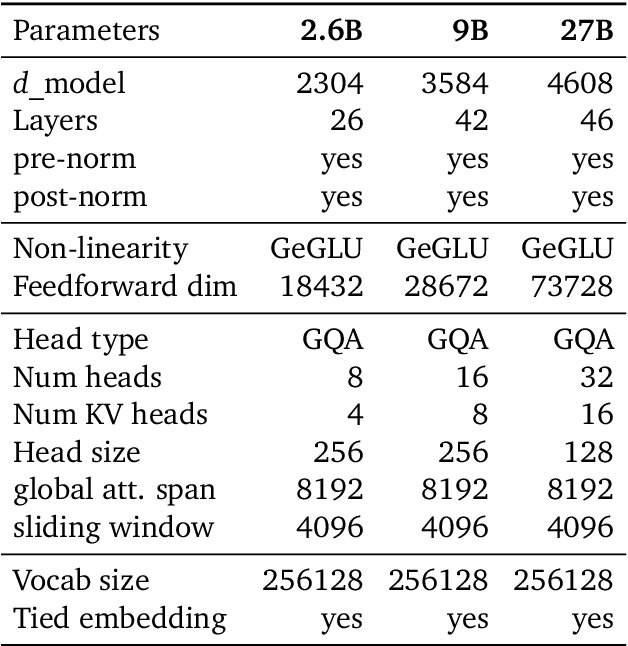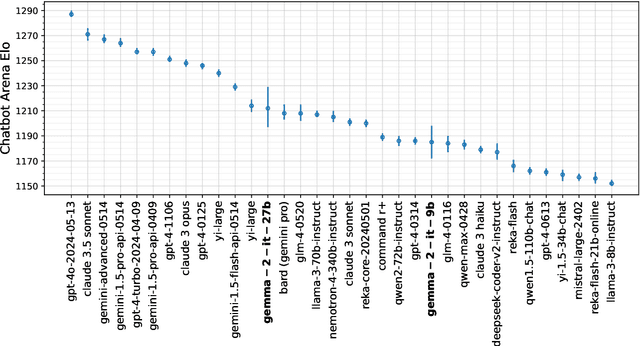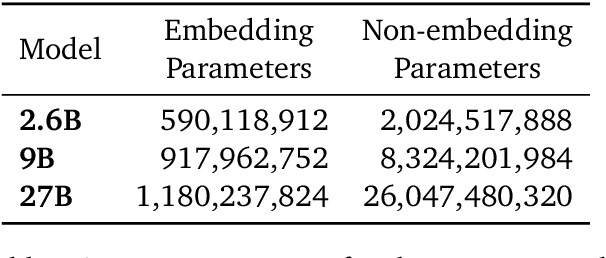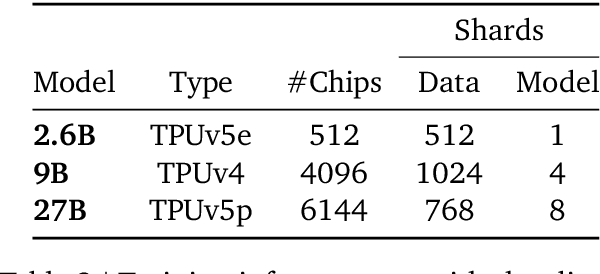Sammy Jerome
Dima
Gemma 3 Technical Report
Mar 25, 2025Abstract:We introduce Gemma 3, a multimodal addition to the Gemma family of lightweight open models, ranging in scale from 1 to 27 billion parameters. This version introduces vision understanding abilities, a wider coverage of languages and longer context - at least 128K tokens. We also change the architecture of the model to reduce the KV-cache memory that tends to explode with long context. This is achieved by increasing the ratio of local to global attention layers, and keeping the span on local attention short. The Gemma 3 models are trained with distillation and achieve superior performance to Gemma 2 for both pre-trained and instruction finetuned versions. In particular, our novel post-training recipe significantly improves the math, chat, instruction-following and multilingual abilities, making Gemma3-4B-IT competitive with Gemma2-27B-IT and Gemma3-27B-IT comparable to Gemini-1.5-Pro across benchmarks. We release all our models to the community.
Gemma 2: Improving Open Language Models at a Practical Size
Aug 02, 2024



Abstract:In this work, we introduce Gemma 2, a new addition to the Gemma family of lightweight, state-of-the-art open models, ranging in scale from 2 billion to 27 billion parameters. In this new version, we apply several known technical modifications to the Transformer architecture, such as interleaving local-global attentions (Beltagy et al., 2020a) and group-query attention (Ainslie et al., 2023). We also train the 2B and 9B models with knowledge distillation (Hinton et al., 2015) instead of next token prediction. The resulting models deliver the best performance for their size, and even offer competitive alternatives to models that are 2-3 times bigger. We release all our models to the community.
Data-Efficient Learning via Clustering-Based Sensitivity Sampling: Foundation Models and Beyond
Feb 27, 2024



Abstract:We study the data selection problem, whose aim is to select a small representative subset of data that can be used to efficiently train a machine learning model. We present a new data selection approach based on $k$-means clustering and sensitivity sampling. Assuming access to an embedding representation of the data with respect to which the model loss is H\"older continuous, our approach provably allows selecting a set of ``typical'' $k + 1/\varepsilon^2$ elements whose average loss corresponds to the average loss of the whole dataset, up to a multiplicative $(1\pm\varepsilon)$ factor and an additive $\varepsilon \lambda \Phi_k$, where $\Phi_k$ represents the $k$-means cost for the input embeddings and $\lambda$ is the H\"older constant. We furthermore demonstrate the performance and scalability of our approach on fine-tuning foundation models and show that it outperforms state-of-the-art methods. We also show how it can be applied on linear regression, leading to a new sampling strategy that surprisingly matches the performances of leverage score sampling, while being conceptually simpler and more scalable.
 Add to Chrome
Add to Chrome Add to Firefox
Add to Firefox Add to Edge
Add to Edge